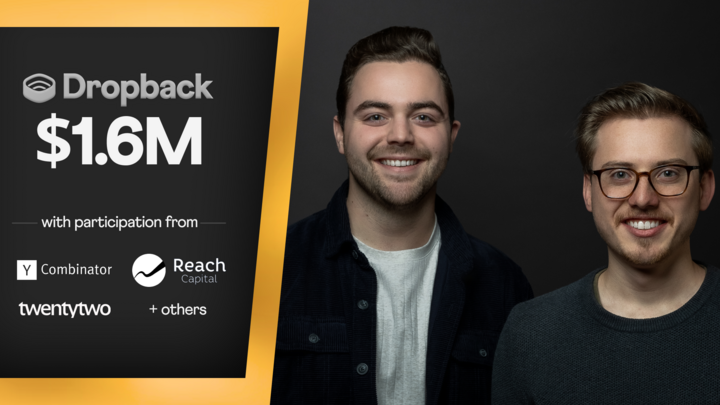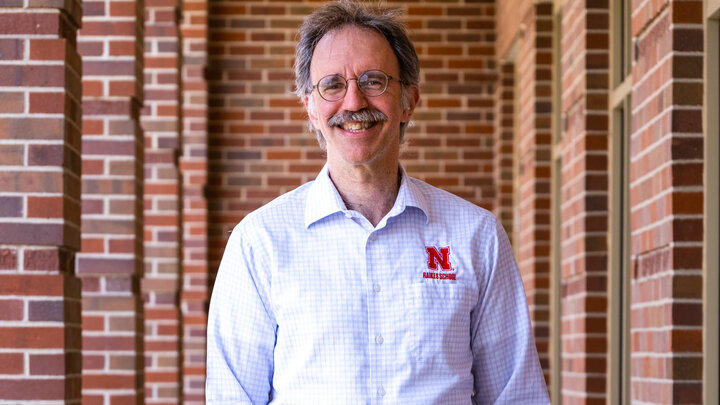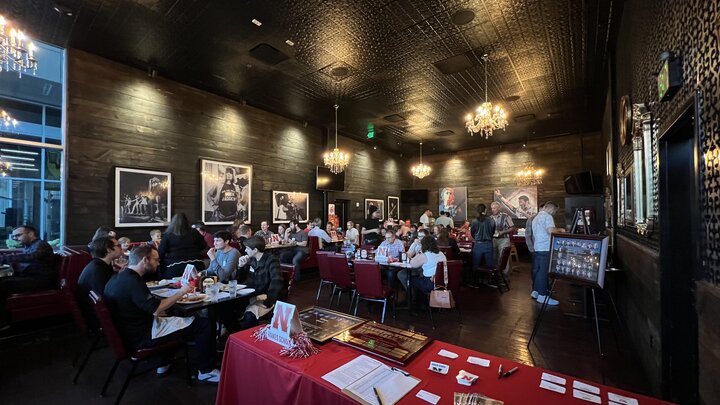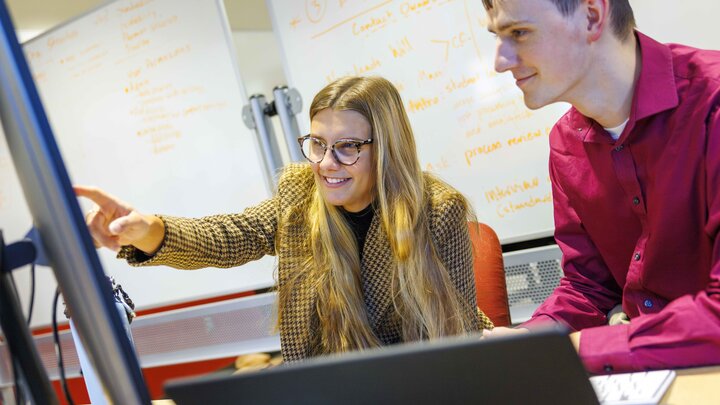The Raikes School caught up with cohort 2017 alumni Luke Bogus and Nick Siscoe, co-founders of Dropback — a front office tech suite for elite college programs in the new era of college sports.
Can you tell us a bit about yourselves?
Luke Bogus: I was born and raised in Columbus, Nebraska. It was a no brainer that I was going to Nebraska, but it wasn't until my junior year of high school that I figured out what the Raikes School was. I stumbled across a sign for the Raikes School while I was walking across the Union with my dad for a Nebraska spring game. I was scrolling my phone on the Raikes School website the whole time, and that's when I figured out everything about the program and applied. I had a blast for four years then moved to Seattle for my first job out of college at Microsoft.
After a year, I had the opportunity to join a Series A startup called Vile, and while I was there, they raised their Series B. It was roller coaster year and a half of craziness. I learned what a Silicon Valley startup looks like and how it operates as their first product manager. I left as the head of product overseeing over seven product managers and product ops, plus a couple of interns. I also led the engineering team the last couple of months I was there.
It's wild that 18 months after being a Design Studio lead, I was the lead of a Series B company that brought in $100 million for around 20 engineers. I felt a ton of imposter syndrome. I was getting thrown into the fire, learning a lot of stuff, and it gave me the courage to convince Nick that we should start a company. And so that's what we did. NIL (Name, Image, and Likeness) is broken, so let's fix it.
We've been riffing on Dropback for a year and a half, and it's been a blast. It's crazy that we just casually kept in touch for years and never thought that we'd start a company together, let alone raise $1.6 million and make a real team. I’ve got to pinch myself -- it's been crazy these last few years.
Nick Siscoe: I grew up in Kansas City and never had any idea I would go to Nebraska. I had a teacher who mentioned that since I was interested in computers (which at the time meant I played video games), “I had a student a few years ago go to the Raikes School, and you should check it out.” I was thinking about studying management information systems, business, or something with technology. I never knew I wanted to be an engineer, but I looked at the Raikes School and loved it.
I wanted to start with computer science and see if I needed to bail and do something else. I ended up loving coding and loving Nebraska. I wanted to attend a college with a Big Ten football program while also having the academic opportunities I wanted. The Raikes School was a perfect fit.
I never thought I would be super entrepreneurial. I was always working on different projects and just making stuff that I thought was fun. That naturally progressed towards becoming more entrepreneurial, doing different side projects, doing pitch competitions and then, with Jacob Gideon (cohort 2017), being the first student startup team in Design Studio. At the time, Mark Antonson, Director of Design Studio, and Steve Cooper, Executive Director, were unsure if this was even going to be something that they wanted to support. We thought we should just try it because, selfishly, we would rather work on something we want to do than work on a random project. That was just a whirlwind and a crazy experience, and I learned so much about what it's like to enjoy work every day on something and not have someone tell you what to do. You have to “just figure it out.” I learned a lot through that experience and ended up following through towards the end. After the startup project ended, Gideon and I went our separate ways. He was going to live in New York City, and I was going to move back to Kansas City.
After graduation, I worked at a company called PayIt as a software engineer for a couple of years, and honestly, the itch never left of “it sucks to be in the building.” I just felt like there were a lot of things I wasn't able to do that can only be done in a startup setting. Long story short, Luke and I had kept in touch over the last few years out of college playing VR golf every few weeks, and he had quit his job. We thought it would be cool to start a company, and we dabbled on different ideas, but ultimately decided it had to be sports. Like Luke said, we put in an application to Y Combinator (YC), and the rest is history.
Can you take us back to when you first began thinking about applying to Y Combinator and what that experience was like, and ultimately building Dropback?
Nick Siscoe: Jacob Petticord (cohort 2017) and I were really into YC. We participated in a hackathon our freshman year, and I always followed YC from the sideline. But I was mostly just consuming YC’s YouTube content. Paul Graham has a lot of essays I loved. The application deadline was due on a Wednesday night. We had just one conversation with this NIL collective in North Carolina, and I don't even really know how or why that happened, but I thought we should just throw something together. The next day I received an email that we had a 10-minute interview on Friday. Going to YC was definitely more than learning a lot about running a company. You're surrounded by all these really smart people and you realize that from the outside looking in, all these companies look super successful and are raising tons of money. However, these people who are your age and who you look up to are also struggling and not going anywhere regardless of how it looks from the outside. That’s probably the biggest lesson, honestly, is maybe it’s an imposter syndrome thing. But just realizing that, as people in YC, say, “you can just do things like there's nothing stopping you from starting a company and going the full distance.” There's nothing that these other people have that we don't have in Nebraska, at the Raikes School.
Luke Bogus: I don't have much to add other than the application process. Nick thought we should apply, and I thought, “Oh, yeah, that's hilarious, one of 10,000 people that apply lol.” Then, we decided to put something together. I said, “I think it's due at midnight tonight, right?” It was due at 5 pm. Pacific time. From there it was like a movie in the sense that we literally submitted the application an hour before it was due. Retrospectively, it worked really well to our favor. A lot of people spend days and hours on this application and write this essay that is super technical. We didn't have the time, and we didn't have that much knowledge. We had one conversation, so we kept the application submission tight, short, and high level. It came across as clear, concise, and interesting. And so, it worked out in our favor. Of course, hopping on the Zoom call to see Dalton Caldwell interviewing us when I'd watched dozens of his videos about how to start a company was a little nerve-wracking, but it was part of the fun.
Nick Siscoe: I want to add one other anecdote about when we went to the first YC reception, the Retreat. You start with a three-day retreat and the very first night we arrived, we were geeking out because all these people and companies we idolize were there. There was a dinner the first night, and every company pitches to every other company. There were approximately 200 people in the batch to talk about what their company is working on. You get 30 seconds for your pitch. I was scared, and I didn't even have to do the presentation. Luke went up there for 30 seconds and gave the pitch, and we were selected as the most promising company in all of YC! It was an immediate icebreaker for the rest of the batch. Anyone we walked up to said, “Oh you're the sports guys who are super promising lol.” So that helped a lot.
Luke Bogus: We were just laughing that whole night because we were walking up and thinking we don't deserve to be here. When we checked in as Dropback, we were told that we were the last company selected. And then, fast forward three hours, we were selected to be the winners.
Nick Siscoe: Yeah, I mean people are surprised at how lightweight YC is. They are basically angel investors; they give you money in exchange for what will be ownership in your company. And during the batch, obviously, you have dinners and different activities. You meet with tons of people and they're actually very, very nice about encouraging you to follow your own passions, interests and curiosities. They are not cutthroat and ruthless nor do they tell you exactly how to make your business successful. They mostly just hold your hand and follow the journey you want to take. In terms of pivoting and figuring out what we wanted to do, there was never an issue considering what YC would think. We selfishly wanted them to like it, but we had full ownership in that respect.
Luke Bogus: Yeah, their whole shtick is that YC intentionally only has one office hour every other week, you meet with your batch mates every other week, and you have dinner once a week. That's it. There's no co-working space; there are no daily events. They infuse in you that post-YC, you shouldn’t use it as a crutch. We didn't have to double check our work with them if we didn't want to. The more you put in the more you get out, of course. Even when we pivoted and we started from scratch again, we rested on the things that we learned in the batch. We weren’t in YC for very long, either. We found an Airbnb on Christmas Eve and we had to be out there by January 11th. A lot of people permanently move to San Francisco but we didn't. Nick lives in Kansas City and my fiancé attends UNC here in Chapel Hill. It was kind of weird saying bye to our fiancés for a few months, but we knew we wouldn't be in San Francisco for long. We stayed in the Airbnb for three months, then returned home. Jokingly, most of the time we spent there was coding on the couch of our Airbnb.
Are there skills or experiences from your time in the Raikes School that have served you well so far in your careers?
Nick Siscoe: Good question. Intrinsic motivation is important to keep going when things aren't working. It’s really hard to build a company if you're only motivated by customers and revenue and PR because that stuff dries up and fizzles out. A lot of the discussion in our group sessions focused on what motivates you to work on the thing you're working on and what keeps you going. It was crazy that we're even there in the first place; it was awesome. We're just like “we’re from Nebraska, this is insane.” For people at Harvard or Stanford, it's very competitive and very much like, “well, my friend raised $4 million for a seed, so I need something similar.” We didn't have any of that. We were just along for the ride from the beginning, which I think helped a lot. From a work ethic perspective, I would say we're just more naturally eager and willing to work.
Luke Bogus: The steps that we took at a high-level were what we learned in Innovation Processes (IP). The IP professors aren't just making it up. Big companies had to start somewhere, too. As founders, they must go through a regular process of understanding users, and build something that's a painkiller, not a vitamin. All those things were things we talked about and learned when we were freshmen in the Raikes School. At the Raikes School, we received level-101 content. At YC as part of the entire batch, we were able to soak in the level-201 and 301 content, which is great. It also helps from a humility perspective. I don't have my Harvard peers to compare myself to. There's also the point where the only way that we could leave YC with a fundraised round and a cool app is by aggressively listening to customers and trying different things, being curious, working on stuff, and throwing out dumb ideas. That mentality, because we had so many projects and miscellaneous things at the Raikes School, was like second nature in a way. We didn’t get attached to an idea. It was humbling to know what’s not working. But we want to keep working on this, so we took a step back, and it wasn't a huge hit to our ego.
Do you have any words of advice for recent Raikes School graduates starting their career?
Luke Bogus: I guess I didn't really grasp this until I was out of college after I accepted an offer with Microsoft. It was scary because I felt, “well, there goes the rest of my life and I'm moving out to Seattle.” I thought I’m going to work here until I die, and I just felt like this was a big decision I was making. At my one-year anniversary, I quit my job at Microsoft to work at a startup and after that I started my own. If I would have told myself senior year that I'd be doing this right now, I would’ve said I was crazy. Generally speaking, I think life is short and you should follow your passions and follow things that are interesting. Try a project for a year or two; if you don't like it, try something different. Apply for a job and if you don’t like it, find something different. It's not that deep. I think everyone in college believes you have to be somewhere for six years for it to look good on your resume. We met so many people at YC that had worked at five different companies and were 24 years old. Be good at what you do and do things that are interesting. I think that was my biggest takeaway or my biggest advice that I wish I would have known when I signed the dotted line at Microsoft.
Nick Siscoe: I would say that's probably particularly true in tech. People don't care that you worked somewhere for ten years. I want someone who's good at React and I want someone who's great at managing a team; it's pretty basic. Everyone wants to work with great people and those who fit the bill of what they're looking for. So yeah, I echo what Luke said and that there's always another path; that’s definitely important to realize.
What are you most excited about this upcoming year and what’s next for Dropback?
Luke Bogus: The thing that we're building is still hypothetical. And the thing that we've been working toward actually happening will be really nice. We're kind of taking a bet still. We're on pace to be making meaningful 6-figure-plus revenue in Annual Recurring Revenue (ARR) by the end of the year. We get to work with really cool brands. And selfishly, I hope that we get to go to our clients’ games this fall. And yeah, we're hiring, which is really exciting, too.
I think it's kind of weird too. This isn't just a little project on which Nick and I are working. It's a company that we're trying to build and get revenue and grow profitable. And it has graduated from the project phase because we have meaningful revenue from meaningful customers. Usually after a year of doing stuff, I get a little itchy and begin planning for what’s next. I don’t feel that right now. It's cool to be a year and a half in, and it feels like day one.
Nick Siscoe: Selfishly, I would like to get Nebraska to use our software. So put that out into the universe.



